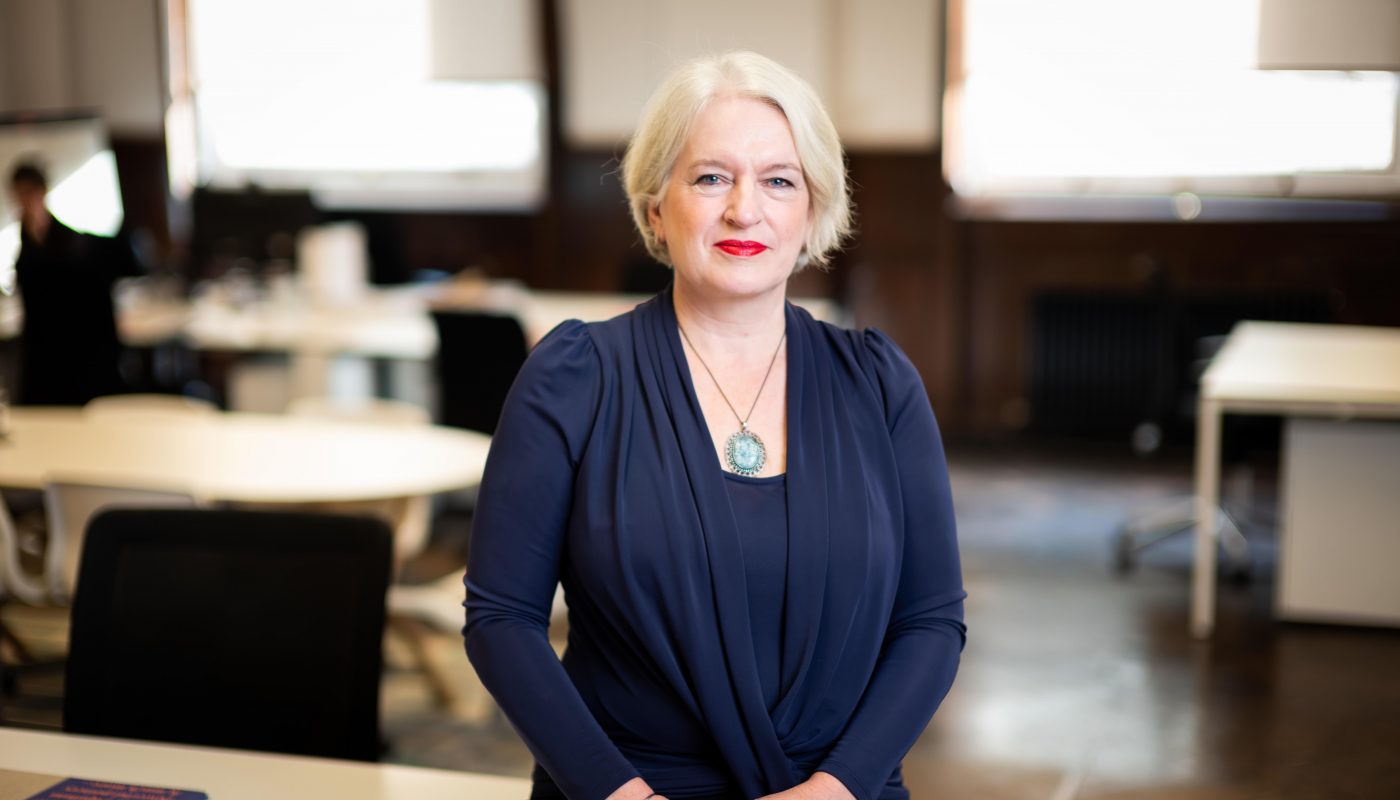Giving is about more than just money
Philanthropy is much more than just giving huge amounts of money says international fundraising and philanthropy expert and CEO of the Philanthropy Company, Caroline Underwood, OBE.
The origin of the word Philanthropy is Greek and translates to “love of mankind”. A more conventional definition according to George McCully in “Philanthropy Reconsidered” (2008) is “private initiatives for the public good, focusing on quality of life” which combines an original humanistic tradition with a social scientific aspect.
Philanthropy is an idea or action that is done to better the world and usually involves some kind of sacrifice in contrast to being done for a profit motive. So, while charity tends to be short-term giving with the primarily focus on rescue and relief, philanthropy is acting and changing for a better world.
The interest in philanthropy among the richest individuals in the world today is unstoppable: In fact, it has become The New Normal, the new concept of normality. As the global ultra-high net worth (UHNW) population grows, there is an increasing expectation that philanthropy should be a shared passion among wealthy individuals according to The New Normal: Trends in UHNW Giving 2019, which is the fourth edition of the Wealth-X report. The numbers drawn by Wealth-X show a growing philanthropy: philanthropic donations by individuals with a very high net worth, of at least 30 million US Dollars, reached $153 billion in 2018 – which equals roughly the US federal government spending on healthcare, education and energy for the same year. The focus of the charitable efforts is also quite clear: Nearly half of all philanthropic gifts or $75 billion are located in North America and almost nine out of 10 donors concentrate most of their giving on education.
"There is an increasing expectation that philanthropy should be a shared passion among wealthy individuals."
Wealth-X Philanthropy Report 2019
Nevertheless, in a time of global change also the way donors approach philanthropic causes is constantly evolving and innovative forms of giving are opening new ways for collaborations with not-for-profit organisations and the educational sector. An expert in fundraising and philanthropy, we spoke to Caroline Underwood, OBE about guidance, risks and trends in the world of giving.
Caroline Underwood is CEO of the Philanthropy Company, a fundraising agency based in London, Member of the British Institute of Fundraising and Fellow of the Royal Society of Arts. Her career has spanned theatre, museums, international development, capital projects and universities while training teams and directors as well as advising philanthropists and boards. As a result, she founded the Philanthropy Company in 2002 to work with philanthropists, senior leaders and organisations with a common vision: “to shift the needle on philanthropic giving and create meaningful giving opportunities between donors and those they support”. For her ongoing dedication Caroline was awarded an OBE for charitable services in 2017’s HM The Queen’s Birthday Honours.

Ms Underwood, what does philanthropy mean for you?
The general meaning of philanthropy is “for the good of humanity”, but I think it has come to mean “people give a huge amount of money”, so it only includes people who are wealthy. I don’t agree with this description, in my view it is anyone who is giving their time, their energy, their expertise and their money to help make the world a better place – it can be small or big actions, a quite literal meaning of “for the good of humanity”.
How do you become a philanthropist?
You become a philanthropist if you give your time, energy, expertise and money thoughtfully and strategically. It is interesting to watch people go on a journey of becoming a philanthropist as most people start giving in a very scattergun way, they might support their local charity or school, but when they start asking “how can I do this more impactfully or more strategically”, in my view that’s when they become a philanthropist.
Is there a certain time in life when you become a philanthropist?
It is starting to be younger and younger, people between 25 and 45 really think differently about philanthropy. Previously, people started thinking about giving at the end of their career but due to companies with social purpose and the generally higher interest, people think about philanthropy much much earlier. Additionally, nowadays you are allowed to have this sense of self, beyond your job and your family while previous generations just weren’t allowed to think like that about themselves, they were a banker or a lawyer and that was it. I am working with some nextgen philanthropists who really want to do things their own way.
"Philanthropy means anyone who is giving their time, energy, expertise and money to help make the world a better place."
Caroline Underwood, OBE, CEO of the Philanthropy Company
How do you guide philanthropists and their interests?
Most people come with some idea or a very strong idea of the project or mission that they want to support but it’s really hard to find something distinct. For example, when you say you interested in supporting young girls. Do you want to do that through education or safety? There are many different lenses. Others have sort of started projects but are not quite sure how to take it forward and some have already put in a huge amount of time and money to get something going and don’t know how to get it to the next level. What we do is to work with philanthropists and their families, to articulate what they are trying to achieve, to align their objectives with impact and pragmatism. We also do all the practical parts like undertaking scoping or research and getting people in touch with lawyers or website developers and might go on to establish and run philanthropic programmes.
What could these interests look like?
We had one person who spent all his working life in the corporate environment, probably 60 to 61 years old and came to us saying he wanted to fix homelessness. He literally said, “I’llget some guys, we’ll put some money in and fix this”. I helped him to discover how incredibly complex the issue of homelessness is and its links to dependency, financial issues, abusive relationships and over the course of 18 months he went from “I’m going to fix homelessness” to setting up a donor advised fund which has two or three very focused programmes within. This is a very good example of someone who genuinely wants to make a difference but has not anticipated how complex it is to do this effectively.
Are the interests of philanthropists usually close to home?
There is an increase of people giving where they live, often because they literally see the issues on their way to work. There is also one family that we work with who supports a school in West Africa because of a business link in the past. This support has become their main philanthropy while they don’t do much at home. However, I would encourage people to do something where they live as well as another project, because in this way you can really help to build communities and it will also encourage other people to participate and give as well.

Do these interests change throughout a lifetime or are people usually fond of similar charities, universities, arts and heritage?
I have spoken to a lot of people who said I have given or am giving to lots of arts companies or schools, but there always comes this moment when they think “how I can make a real difference”. So yes, I think interests do change and as people get older, they want to give where they see a difference and possibly get their children and grandchildren involved as well. Besides, with disaster, for instance, the terrible bush fires in Australia, you get this extraordinary step up of philanthropy, of people that never would have thought about giving like that before. These big world events create new giving and new ways of thinking about it.
Is there a difference in generations where the focus lies?
At a younger age as in lots of other things, people don’t want to do things that have been done before. They don’t necessarily want to create their own charity but want to do things in a different way. For example, I was with someone yesterday who is from a big privately-owned company, probably 30 and wants to thrive environmental projects. She doesn’t want to do it too formal and wants it to be a social media based push, via a loose network of her friends and business contacts.
What impact on society does philanthropy have today?
Around the world 2.5 billion people claim they help a stranger every year and nearly a fifth of all adults globally volunteer, both figures are not philanthropy per se, but it is all part of the journey. The big impact that philanthropists can have is that they can innovate and do projects to proof a concept, that can’t get funding otherwise. Moreover, they can win others over to give as well. Think of the Gates Foundation – they are huge philanthropists, giving lots of money and they created a giving pledge to encourage others to give. So their impact is huge in terms of money but even more amplified through their expertise and their persuasion of others to give.
"Philanthropists can innovate and are able to win others over to give as well."
Caroline Underwood, OBE, CEO of the Philanthropy Company
You are also a consultant for charities on growing income – do you think some purposes are often overlooked?
There are some really unpopular causes like slavery and human trafficking. These are important but they sometimes have complex links with criminality and therefore quite risky. It is also a brutal and very sad area. People who think “I would like to do something philanthropic”, don’t usually think about these topics. They think about helping a local school, helping children or elderly people.
Do philanthropists donate exclusively money?
The easiest way to give back is money, the most difficult one is to get involved, to give your expertise and experience as well as money. We receive a lot of requests from people who ask how they can support a charity through expertise, joining a board or mentoring. The general rule is, the more they are involved, the more they give.
And what do you gain from your dedication to charitable services?
Research shows that philanthropy is good for your health, it makes you feel good and has a positive effect on your physical health. A study at John Hopkins University, for instance, came to the result that people who are philanthropic have lower blood pressure than others who didn’t. Furthermore, research from Harvard University says that giving simply makes us happy: Giving money to someone else lifted people’s happiness more than spending it on themselves. Altruistic behavior releases endorphins in the brain which leaves a positive feeling, known as the “giver’s high”.
How does the collaboration of charities and philanthropists work on a daily basis?
You can always do it in a light touch or a very involved way, we see a whole range of involvement. Usually philanthropists start with the wish to really be involved and after some time they hire someone to fulfil the relevant tasks and who reports back to them. Which is comprehensible as they are very busy people: If you run a big company or family business it’s unlikely you want to report to the charity commission, sort out staff issues or run the website.

How can you make sure that these relationships are meaningful and sustainable for the beneficiaries as well as for the sponsors?
If you are the Executive of a charity and you have big philanthropists, it is not dissimilar to having investors: You want them to be confident in what you are doing and to believe in and know your direction of travel but not to be involved in the day-to-day detail nor executive decisions. That often doesn’t work as smoothly as that and sometimes philanthropists think they can have more say. But if you are, for instance, working with a charity that is all about childhood opportunities, the best people to know about these opportunities and how to keep the children safe are the executive staff and not the philanthropists. It has to be a balance between the parties involved.
The same applies for people who set up their own charity, run it for a bit and then don’t know what to do with it. My advice would sometimes be to not set up your own charity because you are not necessarily the expert in how the charity will deliver, you might be better linking with an existing expert charity. If it is a straight-forward, let’s say, we want to raise money for medical research and we are giving it to another charity, that’s a different story. Nevertheless, the days of just setting up something are gone; you need to do everything professionally.
Do you see a danger in the dependence of charities, universities, arts etc. on private contributions?
The ideal case is where private contributions create leverage, which can become really powerful. For example, I worked on a big project where something like 50 million Pounds from philanthropic initiatives were matched with government funding and it became a 100 million Pound project. Does this create dependency, yes, but diversification of funding is key.
What will the future of philanthropy look like? Do you see any trends for years to come?
There are quite a few emerging trends – an absolutely important one is the environment; another is the separation of charities and philanthropists as well as a much closer movement between charity and advocacy. And there is another significant one: If you donate a lot of money, you draw attention to yourself and that has risks associated with it. Therefore, more people are choosing to give anonymously, and risk assessment becomes a vital consideration. I’m also really excited about some of the next generations of giving. Just the other day I was invited to speak at the Dragon School in Oxford, UK – it was probably one of the most challenging audiences one could have – 150 very bright 11 year old girls and boys! I spoke about people that change the world, from Greta Thunberg, to Bill and Melinda Gates to people closer to home and how these children could think about their role in the world, how they can make small and big changes at home and as they develop their careers. It was hugely exciting. Many of them are from families that already make major philanthropic gifts, many are from international families and the level of challenge and questions was extraordinary. It really gave me hope for a new generation of thoughtful philanthropists!
Further information: